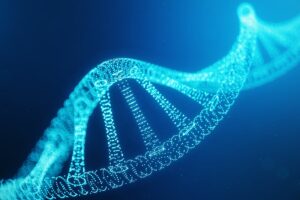
There are plenty of personal traits you have no control over. When you’re born, the natural color of your hair, how tall you are and whether or not you need glasses aren’t up to you. Those traits, like so many others, are based on your genetics. But what other traits and behaviors do genetics impact?
There’s a misconception that people who suffer from addiction lack will power. But in reality, this has nothing to do with how people develop an addiction. The environment around you can certainly play a role in substance abuse, but what about the genes that make up every part of you? In this post, we’ll examine whether or not there is a genetic predisposition to addiction.
The Genetics of Addiction
The question of whether genetics play a role in addiction isn’t new. Early studies got their start by looking into cases of addiction in twins. Identical twins come from the same egg, and as a result, they share almost all of the same genes.
In these early studies, if one identical twin was suffering from addiction, the other did, as well. This was the first indication that genetics are a factor in the development of a substance abuse disorder.
Of course, the hunt for an addiction gene has been much more complicated than simply conducting twin studies. What additional research has shown is that there is no one gene that determines the likelihood of addiction, unlike the single genes tied to physical traits like eye color. Rather, there are a variety of genes that factor into your risk for addiction.
How Genes of the Reward Center of Your Brain Can Predict Addiction
Your brain is made up of neurotransmitters like dopamine and serotonin that get released when you eat a dessert, receive a present or participate in an activity that you enjoy. Research suggests that this release of “feel good” chemicals can be traced back to early hunters and gatherers, helping them to survive.
Whether we’re talking about the past or the present, the way the brain releases pleasure-inducing neurotransmitters changes from person to person. For example, the DRD2 gene is a gene that causes the brain to release more dopamine than usual. Research has shown that people with this gene are more likely to develop an alcohol or cocaine addiction.
A Genetic Predisposition Doesn’t Automatically Lead to Substance Abuse
It’s important to note that even if you are genetically predisposed to addiction, it doesn’t mean you will automatically develop a substance abuse disorder. It does mean, however, that you might need some extra help overcoming addiction. Addiction treatment programs like The Raleigh House can get to know your family history with addiction and help you overcome the unique challenges you might be facing.
Researchers say that genetics play about a 50 percent role in your risk for addiction. There are other genetic factors that can increase your risk, as well.
Co-Occurring Mental Health Disorder and Addiction
Your genetics also determine if you’re more likely to develop a mental health disorder. People who suffer from mental health disorders are more likely to develop an addiction. Often times, people use drugs or alcohol to cope with the symptoms of their mental health disorder. And if someone has a genetic predisposition, the likelihood of them getting caught in a cycle of substance abuse increases.
Reclaim Your Life from Addiction at The Raleigh House
The Raleigh House is Colorado’s premier drug rehab and dual diagnosis treatment center. We know that when you’re struggling with addiction, you can feel stuck in a cycle of substance abuse.
Remember that addiction is not your fault. You had no control over your genetics or the environmental factors that fueled your substance abuse. But no matter what addiction has taken from you, there’s hope for you to get it all back.
We have over 10 years of experience using evidence-based treatment to help clients recover from addiction and mental health disorders. The Ranch, our inpatient rehab center in Denver, can help you start moving towards lasting recovery. Additionally, our horticulture and ecotherapy program offers a unique approach to healing and can support your recovery process in a natural, therapeutic way.
You have the potential to break free from your addiction. Contact our compassionate admissions team today to start your recovery journey. We’re ready to hear your story and find the right addiction treatment program for your unique struggle.
